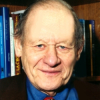Paul Kurtz

Paul Kurtz
Paul Kurtzwas a prominent American skeptic and secular humanist. He has been called "the father of secular humanism". He was Professor Emeritus of Philosophy at the State University of New York at Buffalo, having previously also taught at Vassar, Trinity, and Union colleges, and the New School for Social Research...
religious self support
Homo religiosus invents religious symbols, which he venerates and worships to save him from facing the finality of his death and dissolution. He devises paradise fictions to provide succor and support... In acts of supreme self-deception, at various times and in various places he has been willing to profess belief in the most incredible myths because of what they have promised him.
religious commitment rights
The overriding need is "to develop a new Planetary Humanism" that will seek to preserve human rights and enhance human freedom and dignity and will emphasize our commitment "to humanity as a whole." The underlying ethical principle "is the need to respect the dignity and worth of all persons in the world community." Thinkers as diverse as Peter Singer and Hans Küng also emphasize the need for a new global ethic beyond nationalistic, racial, religious, and ethnic chauvinism.
religious philosophy atheism
Secular humanism is avowedly non-religious. It is a eupraxsophy (good practical wisdom), which draws its basic principles and ethical values from science, ethics, and philosophy.
destiny hands meaning-of-life
It is not the courage to be that we must develop as much as the courage to become. We are responsible for our destiny. The meaning of life is not located in some hidden crevice in the womb of nature but is created by free persons, who are aware that they are responsible for their own futures and have the courage to take this project into their own hands.
atheism needs foundation
Humanists hold that ethical values are relative to human experience and need not be derived from theological or metaphysical foundations.
good-life destiny able
The beginning of wisdom is the awareness that there is insufficient evidence that a god or gods have created us and the recognition that we are responsible in part for our own destiny. Human beings can achieve this good life, but it is by the cultivation of the virtues of intelligence and courage, not faith and obedience, that we will most likely be able to do so.
fool belief scientist
Only a fool of a scientist would dismiss the evidence and reports in front of him and substitute his own beliefs in their place.
life-and-love tree fruit
The meaning of life is not to be discovered only after death in some hidden, mysterious realm; on the contrary, it can be found by eating the succulent fruit of the Tree of Life and by living in the here and now as fully and creatively as we can.